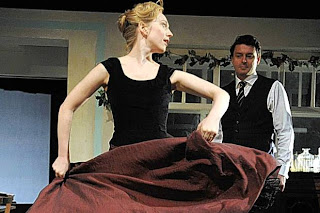'A Doll's House' review or 'Hattie brings the house down!'
'A
Doll's House', Henrik Ibsen
English
language version by Simon Stephens
Written
for Culture Wars
It's
Christmas time. As the stage revolves, we're shown a montage of
festive preparation scenes. Nora Helmer dashes about her house,
marvelling at her gifts and stashing them away. This is a woman who
clearly loves to shop. This is a woman who instinctively keeps
secrets. This is a woman who likes to play with fire, munching
gleefully on chocolates as her husband – who has banned such
extravagances – sits hunched in small dark room next door.
At
first, Hattie Morahan's Nora resembles a kid let loose in a
playground. When her old friend, Kristine (a no nonsense Susannah
Wise) turns up, Nora sits by her knee, like a young lass with her
mother. The two scamper off to Nora's bedroom and loll about on the
bed, gossiping like teenagers. You can read the whole of 'A Doll's
House' in Morahan's eyes and, at these early stages, they sparkle
with mischief. Morahan's Nora is the heroine of her own drama and, as
she confesses her huge debt problems to her oldest friend, she seems
exhilarated by the ghastly drama of it all.
Yet
even at her most naiive, Morahan's Nora is gutsy and determined too.
When Kristine accuses her of behaving recklessly, Nora proudly stands
her ground: 'People shouldn't underestimate me, Kristine. You
shouldn't underestimate me.' Later, when Doctor Rank confesses to
Nora that she is dying, she shoulders this burden alone. When he
delivers his checked visiting card – a sign his death is imminent –
there are few, loaded moments in which only Nora knows the truth.
Morahan's Nora does not crumble with this knowledge. In fact, she
seems positively emboldened by it.
Indeed,
this is a Nora who grows stronger as her dilemma deepens; a Nora of
extraordinary hidden reserves and hidden selves. Morahan's voice has
the most exceptional range and we're treated to a virtuoso display,
as her voice dips and soars at will. One gets the impression that
these voices are just the beginning and that there are hundreds more
Noras hiding behind that china-white face, waiting to be deployed
when the moment is right.
Perhaps
inevitably, the remaining characters seem muted. Morahan's
performance tumbles right out of her – every giggle thickens up her
role – and yet all the other actors hold back. Stephens' script is
economical but it is not cold and it is not static – if handled
correctly. The confrontation between Kristine and Krogstad (Nick
Fletcher) feels stiff and Steve Touissant's Doctor Ranks is so coiled
up that his character, even when at his most vulnerable, struggles to
wriggle free.
Nora's
husband, Torvald Helmer (Dominic Rowan) is excruciatingly self
righteous and patronising but he is too far removed from everyone
else. The scenes between Torvald and Nora, particularly near the end,
never fizz as they should. It feels like Nora is talking to a model
of her husband rather than a living, breathing chap.
But
it's still a brilliant conclusion. When Nora eventually turns against
her husband, it's as if all Morahan's carefully placed character
clues are finally strewn about the stage. All those clever little
glimpses into Nora's soul, laid down by both Morahan and her director
Carrie Cracknell, suddenly shine with incredible force. As Nora
determinedly packs her bags we remember all those times we've seen
her hunched up in tiny corridors, a prisoner in her home. We remember
her peering through the window at her children, as if looking in on
someone else's life. In the wrong hands, this final rebellion can
feel quite jarring. With Morahan, it makes absolute perfect sense.



Comments
Post a Comment